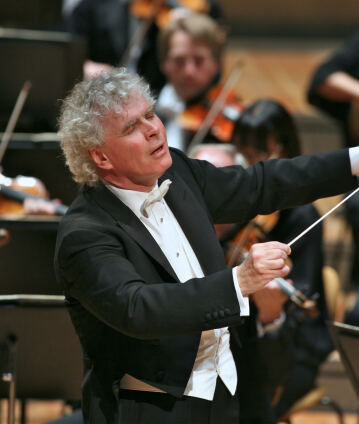Season opening 2010: Sir Simon Rattle conducts Mahler and Beethoven

With this performance of Gustav Mahler’s First Symphony from 2010, the Berliner Philharmoniker and Simon Rattle started a performance of all of the composer’s symphonies, marking both the 150th anniversary of Mahler’s birthday on 7 July 2010 and the 100th of his death on 18 May 2011. What is of particular interest in this cycle, is that each Mahler symphony is paired with another major work – in this case, Beethoven’s Fourth.
Mahler’s symphonic œuvre is of particular significance for the relationship between Simon Rattle and the Berliner Philharmoniker. Not only was a Mahler symphony – the Sixth – performed at Rattle’s Berlin debut in November 1987 but also at his inaugural concert as the orchestra’s chief conductor in September 2002, when the Fifth was played. The recording of the latter became a best-seller in the international CD catalogue and, in Gramophone magazine’s opinion, “it can safely be ranked among the half-dozen or so finest performances on record.”
One of the aims of this performance of Mahler’s complete symphonies is to circumscribe the composer’s place in the history of music. To this end, his symphonies were mirrored against the works of other eminent composers ranging from Purcell to Schoenberg. In this concert we hear Mahler’s First Symphony juxtaposed with Beethoven’s Fourth, giving us the opportunity to appreciate how these two composers, employing the most modern compositional means available to them in their respective periods, used the genre of the symphony to formulate music that lent voice to expression in an unparalleled way.
© 2010 Berlin Phil Media GmbH
Related interviews